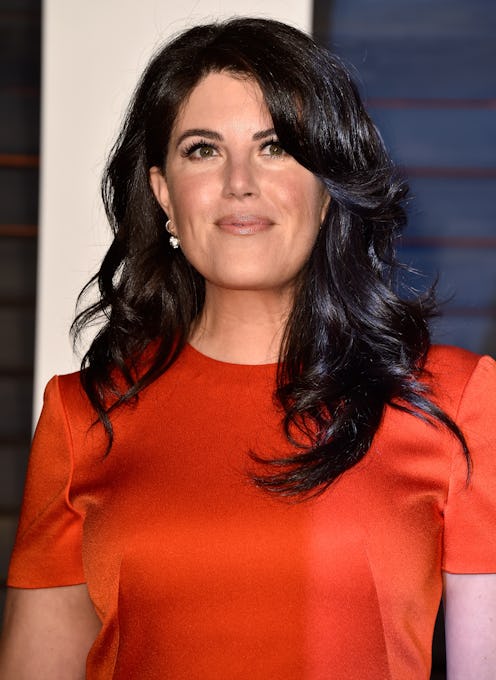News
Monica Lewinsky Says The Bill Clinton And 'Town & Country' Drama Touches On A Bigger Issue

On Wednesday, Monica Lewinsky revealed that she was invited to a philanthropic event by Town & Country magazine, then disinvited once Bill Clinton told the organizers that he'd be in attendance. In an op-ed published in Vanity Fair Friday, Lewinksy discussed the Clinton and Town & Country episode, and said that it's reflective of societal dynamics that stretch far beyond her and the former president.
"What happened to me happens daily to millions of people in myriad ways—especially women," Lewinsky wrote of the incident, for which Town & Country has since apologized. "And, especially women who have been marginalized in society. Sometimes it’s just an innocent (though no less rude) faux pas, but it's often a reflection of the more implicit pragmatics of control and politeness—that is, the implicit messages (in the pauses and silences and things unsaid) that people in power send about how they should be treated by those of different status."
Lewinsky tweeted about the incident briefly on Wednesday, but offered a fuller explanation in Vanity Fair. She says that she had originally accepted an invitation to the Town & Country Philanthropy Summit, but received a phone call from the organizers Friday informing her that Clinton would be giving the opening remarks at the conference. Lewinsky says the organizers assured her they weren't disinviting her from the event altogether, and that as a compromise, she proposed that she arrive a half hour after Clinton's opening remarks, at which point he would have left the event.
But Lewinsky was told that this wouldn't work, she says, and the organizers instead suggested that she skip the conference altogether and only attend the luncheon scheduled to take place later in the day. This, as Lewinsky explained, would mean that she'd have to miss out on speakers she was looking forward to seeing, including Lin-Manuel Miranda, Sean Parker, Wes Moore, and several students who survived the Parkland shooting in February.
"It was quite clear," Lewinsky writes. "My hosts wanted to put me in a position that made the event so unappealing that I would decline—and their social problem would be solved."
In totality, the episode left Lewinsky feeling "stuck in the cocoon of 1998," when her affair with Clinton became an international news story. After the Town & Country incident became public, a Clinton spokesperson said in a statement that neither Clinton nor anybody on his staff "knew anything about the invitation or it being rescinded." As Lewinsky points out, however, Clinton's team pointedly did not condemn Town & Country for disinviting Lewinsky, or in any way express that it was wrong of the magazine to do so.
"By not addressing that the behavior itself was wrong and unacceptable, it sent a tacit message of approval," Lewinsky writes. "Not only as it relates to me personally, but more importantly, to what it says about these situations for anyone—any woman, minority, or person on the less powerful side of the equation who could be sidelined. Wasn’t this, then, a lost opportunity to move this very important conversation forward?"
Town & Country was widely criticized for its handling of the situation. Jean Hannah Edelstein at the Guardian called it "old-fashioned misogyny," and said that the magazine "seemingly didn’t have faith that Monica Lewinsky would be capable of acting like a mature adult" in Clinton's presence, while Charlotte Allen at USA TODAY wrote that it was an example of "a powerful liberal man who always says the politically correct thing about women’s rights being favored by his peers over an actual woman of whose naiveté he took advantage."
Lewinsky writes that, as discouraging as the situation was, she's hopeful that younger generations are "finding it more meaningful to see Tarana Burke on the dais accepting an award or giving a keynote than someone who may have been revered in previous generations."